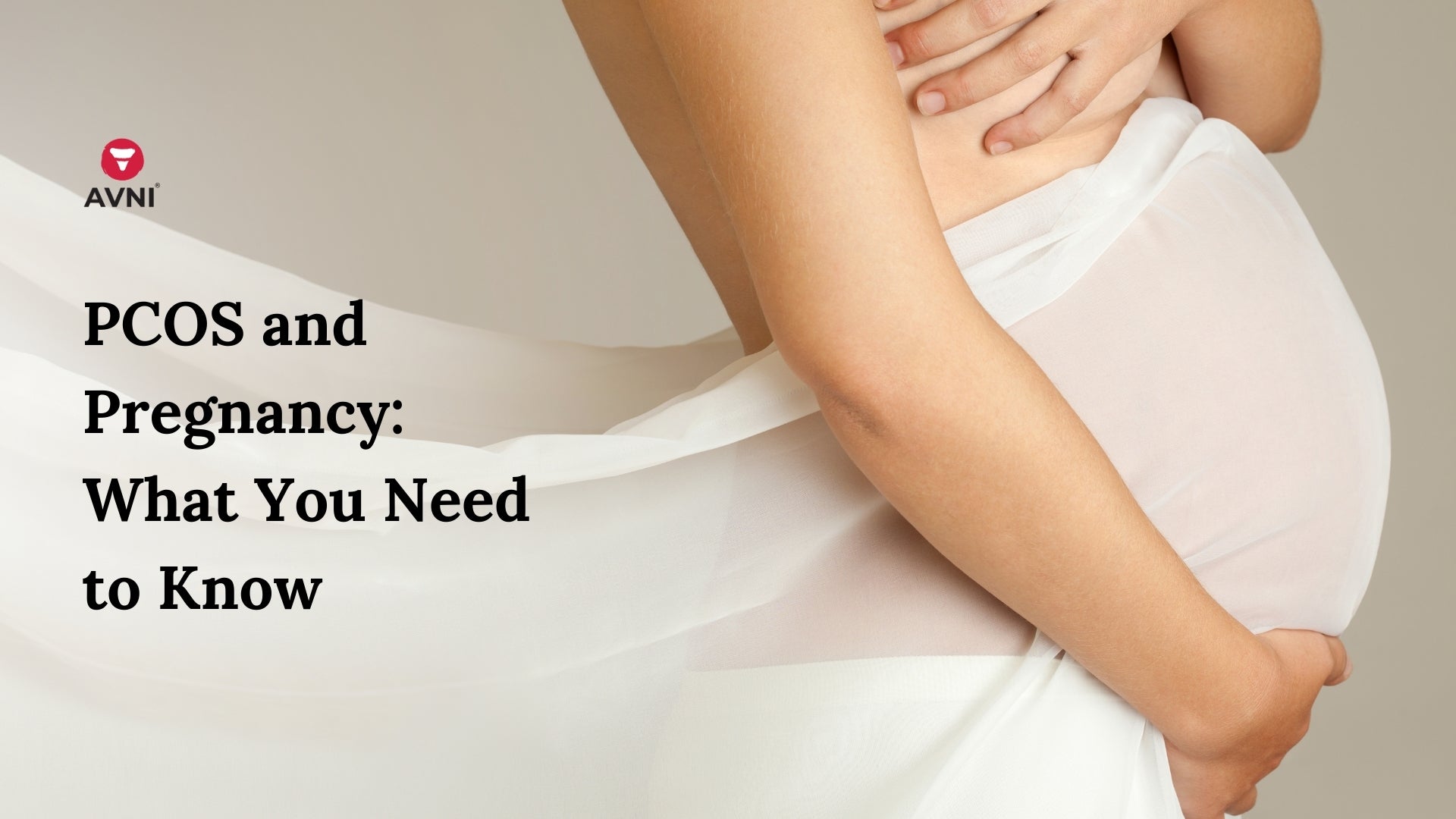
PCOS and Pregnancy: What You Need to Know
There are a lot of reasons why a woman might not be able to conceive. It may be lifestyle issues, it might be a genetic problem, or maybe a partner problem.
However, not much is spoken about (until now) about one of the most common causes of all - the Polycystic Ovary Syndrome (PCOS) and it is high-time we understand the intrinsic link between PCOS and pregnancy.
If you are someone who was recently diagnosed with PCOS and want to know whether you can get pregnant in the future - the short answer is yes.
If you are someone with PCOS but recently married and planning for a child, even you can conceive.
We won’t lie, conceiving when diagnosed with PCOS is more difficult when compared to non-PCOS cases. Not only is the process a tedious one, riddled with disappointments, it may also result in pregnancy related complications as well.
But there is light at the end of the tunnel. Let’s take a look.

The Connection between PCOS and Pregnancy
PCOS is a hormonal condition in which the female body produces more than natural quantities of male hormones, androgens that affect the menstrual cycle, appearance and fertility.
Hormonal Imbalance: Women with PCOS tend to have unusual production of follicle stimulating hormone (FSH) and luteinizing hormone (LH) that disrupts the development of eggs.
Ovulation Issues: Ovulation is important for the body to understand when it is ready to conceive. However, PCOS disturbs this very ovulation process and as a result, disrupts the natural course of pregnancy.
How Does PCOS Affect Pregnancy?
Women with PCOS are at a higher risk of developing pregnancy related complications. In addition to self, babies born to mothers suffering from PCOS often end up getting transferred to the neonatal care for critical development or may pass away before, during or after the delivery.
A few complications as a a result of PCOS pregnancy are as follows:
Preeclampsia: In this case, there is a sudden increase in blood pressure right after the 20th week of pregnancy. The sugar level gushes up so high that it runs a risk of damaging the mother's vital organs like the liver, brain and kidneys. If left untreated, it can lead to eclampsia that may cause seizures and even death. The ideal way to deal with the situation is to go for a premature delivery, usually via C-section. However, it may cause a fresh wave of complications as well.
High Blood-Pressure Due to Pregnancy: During PCOS pregnancy, the mother might develop high blood pressure after the second trimester and can lead to preeclampsia and also have an adverse impact on the ease of delivery.
Miscarriage: Women suffering from PCOS are more likely to suffer from miscarriage in the first three months than compared to the women not suffering from PCOS.
Cesarean or C-Section Delivery: Pregnancy during PCOS can be a complicated procedure and might require a cesarean surgery which may take longer than a natural delivery.
Preterm Birth: A PCOS pregnancy can also lead to a preterm baby, a situation in which the baby is delivered before 37 weeks. Such babies are very likely to develop health problems in later stages.
Gestational Diabetes: As the name suggests, this type of diabetes only occurs in pregnant women and is not as concerning if controlled. Most of the time, this type of diabetes is automatically cured post delivery but might later culminate into Type-2 diabetes later in life. However, during the period, mothers may suffer from weight issues, breathlessness or low blood sugar and might need to undergo C-section.

Measures to Improve PCOS Pregnancy Success Rate
Not all suffering from PCOS have to undergo the same treatments to conceive. A lot depends on the genetic makeup of the person, physical capabilities, and lifestyle etc.
Following are different measures that may help improve the PCOS pregnancy success rate.
Weight-Loss
A lot (but not all) women with PCOS struggle with weight issues since PCOS adversely impacts the insulin production and that results in weight gain. This weight gain is directly linked to improvement of the ovulation cycle that can help those suffering from PCOS conceive.
In fact, losing even 5-10 percent of body weight have shown great results in reviving ovulation and kick-starting the menstrual flow. However, there is a lot to be explored in this field of study.
However, as we suggested, not all those with PCOS tend to be overweight. Therefore, if you are not obese/over-weight and unable to conceive, read on to know what might be hindering your path to pregnancy and how you can make it better.
A Healthy Diet
Those with PCOS are often riddled with either insulin regulation or obesity - both factors that are intrinsically linked with diet. A healthy diet can help negate the impacts of PCOS but there is no specific food chart to speak of.
- Ensure your diet is rich in proteins and greens.
- Have a fuller breakfast.
- Avoid high-carb food and sweets but if you do, combine them with proteins and healthy fats to avoid the sudden spike in sugar level.
- Instead of opting for simple sugar and carbohydrates, go for the complex mode in the form of beans or multi-grain breads etc.
A Fixed Exercise Regime
Having a diligent exercise regime can do wonders in improving your chances for pregnancy during PCOS and not to mention, make you stronger to deal with other complications as well.
Different people have different exercise preferences but nevertheless, all will help reach the common goal of health.
HIIT - High Intensity Interval Training
A blood pumping workout, this exercise works amazingly well when it comes to increasing cardiovascular fitness. It is usually done in a short burst of intervals, followed by a rest period. This interval training is a great way to reduce calories, and burn fat that can help keep PCOS in control to aid pregnancy.
Cardio
Zumba, aerobics, running, swimming or cycling are some of the most amazing ways that can get your blood pumping which can definitely help with PCOS. How? Such exercise can improve insulin sensitivity and reduce the chances to develop type 2 diabetes. Since PCOS is a hormonal disorder, it also intervenes with moods and mental well-being. Cardio exercises are known to simulate the happy hormones - oxytocin that alleviates anxiety as well as depression.
Strength Training
Strength training workouts like squats, weights, and push-ups are great ways to improve muscle mass that in turn fire up your metabolism and help reduce weight, which we all know by now, is crucial when it comes to PCOS management. When combined with cardio exercise, strength training may also improve the insulin functionality and thus reduce the chance for developing type 2 diabetes and even gestational diabetes as well.
Yoga
As per the recent study, while yoga cannot cure PCOS, it can help a lot when it comes to alleviating certain symptoms. For instance, it may help decrease testosterone levels in the PCOS affected body. This may help tip the scales in the favour of hormonal balance and improve the body’s ability to conceive. Poses like the Garland Pose, Bridge Setu and Cat-Cow Pose, to name a few can be helpful.

Medical Treatments
Doctors often prescribe medications to help treat certain symptoms or help with PCOS pregnancy.
Clomid
This is a drug meant for improving fertility and is often used for treating women with PCOS. While it is a widely used drug, it has not been successful for everyone. In fact, many also experience Clomid resistance which is overcome by another medicine combination of clomid and metformin.
Metformin
If you are insulin-resistant, as many women suffering from PCOS are, then you can ask your doctor about the metformin drug. Not only this medicine helps improve insulin functioning but also helps lose weight and most importantly, conceive. However, it is not the absolute miracle medicine to help improve the chances for pregnancy and the statement still requires a research backing.
Letrozole
Sometimes, metformin and clomid do not work. In such cases, doctors suggest the drug letrozole. Actually an anti-drug medication, letrozole has supporting research stating that this drug might be more effective than the aforementioned Clovid in helping stimulate ovulation in women with PCOS. The side-effects are mild and can help women who are trying to conceive.
Gonadotropins
This is the ultimate medication that is used if clomid and letrozole, both are deemed ineffective. Gonadotropins are hormones FSH or LH or their combination which are injected to improve fertility. However, gonadotropins also run the risk of Ovarian Hyperstimulation Syndrome (OHSS) where the ovaries’ reaction to this medication can also lead to fatality. Women suffering from PCOS are often at risk of developing OHSS. In case of any symptoms like fatigue, nausea, or bloating, contact your doctor immediately.

Fertility Measures for PCOS
Fertility measures are the final step deployed when even gonadotropins fail to make an impact. Treatments like In Vitro Fertilisation (IVF) or In Vitro Maturation (IVM) comprise of injecting fertility drugs to trigger ovaries into producing a healthy amount of mature eggs.
These mature eggs are later retrieved and fertilized on a petri dish with the sperm and once the fertilized eggs start to grow and divide, they are later planted in the embryo in a process known as the Embryo Transfer. However, this does not guarantee a successful pregnancy and you might have to wait for two weeks to check the possibility.
While this is great for those suffering from infertility or with partner-related issues, IVF does carry its share of risks for those with PCOS. Like gonadotropins, IVF too can over stimulate the ovaries.
Final Takeaway
PCOS and pregnancy is a sensitive subject matter for most women, especially those planning on starting a family. The impact here is not only physical but emotional as well.
If you are someone with a recent diagnosis or someone with an existing condition but with a hope to start a family, MyAvni community is here to support you in your journey. Confide in those who have been there and talk to medical experts to gain more light on your condition.
We are in this together!



Leave a comment
This site is protected by hCaptcha and the hCaptcha Privacy Policy and Terms of Service apply.